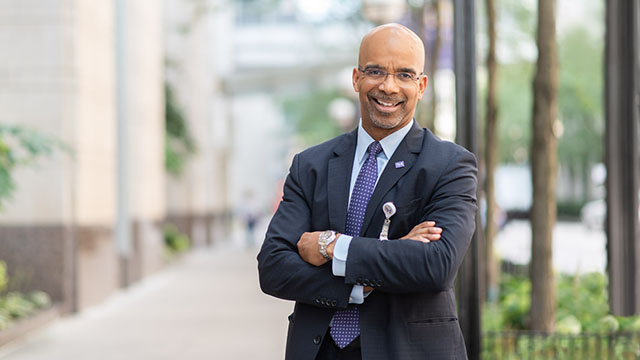As members of our community — and others across the nation — advocate for an examination of the role police departments play in today’s society, Northwestern University officials have announced the formation of a Community Safety Advisory Board (CSAB).
Tasked with reimagining campus safety at Northwestern, this new board intends to consider the many dimensions of community safety. The intent is to begin with a clean slate while embracing the voices of students, strengthening the ties within the University community, and working towards a better understanding of campus safety through a holistic approach.
After a period of critical listening, the board will make recommendations to senior leaders with the goal of equitably improving the safety and well-being of all Northwestern students, faculty, staff and visitors.
Dr. Clyde Yancy, vice dean for diversity and inclusion at the Feinberg School of Medicine, will serve as board chair. Yancy has been actively involved in efforts to support diversity in medicine and the successful recruitment of increasingly diverse classes of medical students and residents at Feinberg. He is a highly regarded author who recently published a viewpoint article in the Journal of the American Medical Association addressing racial equity in academic medicine.
Since the beginning of the COVID-19 pandemic, Yancy has been deeply involved in efforts to raise awareness and combat the unequal impacts of COVID-19 on communities of color. He also is chief of cardiology in the department of medicine, Magerstadt Professor of Medicine and professor of medical social sciences. Over 25 years, he has been a principal voice and scientific author addressing health and disease in African Americans which includes a 2017 scientific statement noting the disparities in cardiovascular disease burden suffered by African Americans and evolving a plan to narrow gaps in care and outcomes.
“As an academic cardiologist, I’ve spent my career studying advanced heart disease and addressing health disparities,” he said. “Whether those disparities are related to health, education, jurisprudence or safety, the root causes are the same: bias, inequitable policies and systemic racism. There are lessons learned in health care that may apply to other areas. I intend to bring to this board a different lens and a process of decision-making that is grounded in the care of those who are ill and based on truth, evidence, careful listening and intentional communication.”
The Community Safety Advisory Board was referenced first in an Oct. 27 message to the community from President Morton Schapiro.
“I can’t think of anyone more suited for this crucial leadership role than Clyde Yancy,” President Schapiro said today. “Clyde’s life work has been about advancing world-class scholarship while building a more inclusive and equitable academic community. I’m looking forward to working with him, our other senior leaders and a range of stakeholders from across Northwestern to create new models for public safety and well-being.”
Membership will include student, faculty and staff representatives and those representing Black, marginalized and the most vulnerable members of the community. Yancy has met with Associated Student Government, the Faculty Senate, the Northwestern University Staff Advisory Council and the Graduate Leadership and Advocacy Council to invite a representative from each to serve on the board and to seek their recommendations for additional members.
The CSAB’s near-term objective is to provide for the safety, well-being and security of the entire University. The long-term objective is a process of open dialogue that will lead to meaningful change.
The board’s key responsibilities include:
- Advise the president, provost and senior vice president for business and finance, and speak on behalf of the Northwestern community regarding safety and well-being;
- Guide implementation of recommendations stemming from the forthcoming external review of University Police;
- Advocate and make additional recommendations for policies, standards and procedures rooted in scholarship and innovative best practices to improve safety on campus;
- Analyze the campus climate regarding community safety, the effectiveness of campus safety efforts and the impact of these efforts on the community, with an emphasis on the experiences of Black, marginalized and the most vulnerable members of the Northwestern community;
- Engage students, faculty and staff to seek broad input and recommendations on how to improve community safety, with at least one event per quarter that is open to all members of the Northwestern community;
- Publish an annual report on the board’s work, the effectiveness and impact of campus safety efforts and recommendations to University leaders.
In the interest of transparency, and to develop a fuller understanding of safety and well-being on campus, the board will have access to University data disaggregated by race, gender and other demographics. The group will meet on a monthly basis.
“The Community Safety Advisory Board and the input of its members will be foundational to our ongoing work in improving campus safety and well-being for everyone at Northwestern,” said Craig Johnson, senior vice president for business and finance. “I look forward to their recommendations and their partnership to create what we hope will become a national model for community safety.”


